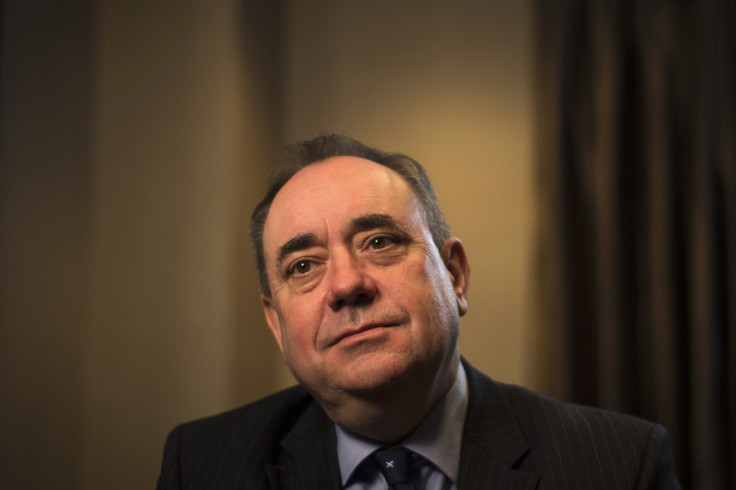Alex Salmond: 10 Ways SNP Leader Changed UK Politics

He's loved by many, and loathed by some, but whatever you think of him it's undeniable that Alex Salmond, who has just taken his final bow as Scottish National Party (SNP) leader, has towered over Scottish politics for a quarter-century and changed the UK forever.
Here are the top ten reasons why progressives in Scotland and throughout these islands should always be grateful to him.
Salmond helped bring the Scottish Parliament into existence in the first place.
In the 1970s, the campaign for devolution had been hamstrung by the Berlin Wall-type division between the SNP and Scottish Labour. Twenty years later, Scotland was fortunate that those parties were led by two men - Alex Salmond and Donald Dewar - who had learned lessons, and were willing to temporarily work together to achieve a common aim.
Salmond was one of the few politicians who held Tony Blair to account over the calamitous decision to invade Iraq.
At a time when most anti-war politicians were holding back for fear of being seen to "undermine the troops", Alex Salmond went for the jugular and campaigned for the Prime Minister to be impeached. With the benefit of hindsight, that was one judgement call he undoubtedly got right.
Salmond remained true to the founding principles of the NHS.
One of the most invidious aspects of the neo-liberal agenda is the claim that "there is no alternative" - and people might almost have started to believe that was true if Scotland hadn't successfully maintained Aneurin Bevan's vision of a truly national health service within the public sector.

Salmond abolished fees for higher education.
Again, there was supposed to be no alternative to students being asked to make some sort of direct financial contribution, but Scotland under Salmond has begged to differ.
The country has reclaimed for itself the greatest of the many gifts it gave to the world - namely free education.
Salmond reversed decades of declining voter turnout.
Almost 85% of eligible citizens cast their vote in the independence referendum – the highest figure since the introduction of universal suffrage. And all that was required to make that happen was to give voters a real choice on an issue that really mattered.
Apathy was shown to be an illusion. The responsibility for low turnouts has now shifted from the public to the grey political class who won't trust anyone but themselves with the big decisions.
Salmond gave 16- and 17-year-olds the vote for the first time ever in the UK.
When the proposal was first made, many sneering London commentators assumed that the ludicrous idea of giving "children" the vote was merely a bargaining chip intended to secure more "realistic" concessions. But Salmond was deadly serious. The genie is now out of the bottle, and it's only a matter of time before the voting age is permanently lowered for all UK elections.
Salmond has made independence almost inevitable.
Yes, the referendum was a gamble, and had the eventual 'Yes' vote been as low as 30% (as many Labour MPs apparently thought was possible in the early stages) the cause could have been set back decades.
But as it is, with a narrow 'No' vote that was only secured with desperate last-minute pledges of "Home Rule", "federalism"' and "Devo Super Max", a tipping-point has now been reached. Either those pledges will be honoured, in which case voters will discover that the scare stories about independence were garbage, or they will be ripped up, in which case voters will react with fury.
In the famous words of Tam Dalyell, we appear to be on a motorway without exit that is heading only to independence.

Salmond has unleashed an unstoppable movement for long-overdue constitutional reform throughout these islands.
All we've had from the coalition at Westminster is failure to deliver on Lords reform, and an embarrassing referendum on alternative voting that extinguished all hope that electoral reform would happen any time soon.
By contrast, the gains won by Scotland as a result of the referendum has ensured that the people of Wales will not settle for second-best.
The people of England are also likely to demand effective control over their own affairs in the near future.
Salmond brightened up public debate with brilliant impish humour that most Westminster politicians would be too scared to employ.
He impersonated George Robertson in the guise of a Dalek, screaming "I obey, I obey, I OBEY!!!!" whenever London Labour is on the line, and he brandished a "bluff" card from the TV show 'Call My Bluff' when Tony Blair was speaking about the supposed dangers of independence at a black tie dinner.
Salmond must be the first departing leader in history who is more feared by his opponents than ever.
He is widely tipped to stand at next year's Westminster general election, and the SNP are currently predicted to emerge as the third-largest party in the House of Commons. Put those two facts together and what do you get?
It's just conceivable that Mr Salmond is only six months away from replacing Nick Clegg as Deputy Prime Minister of the UK. At the very least, he'll be looking to pull the strings to Scotland's benefit in a hung parliament.
James Kelly is author of the Scottish pro-independence blog, SCOT goes POP! and has been voted one of the UK's top political bloggers. You can hear more from James on Twitter: @JamesKelly
© Copyright IBTimes 2024. All rights reserved.







